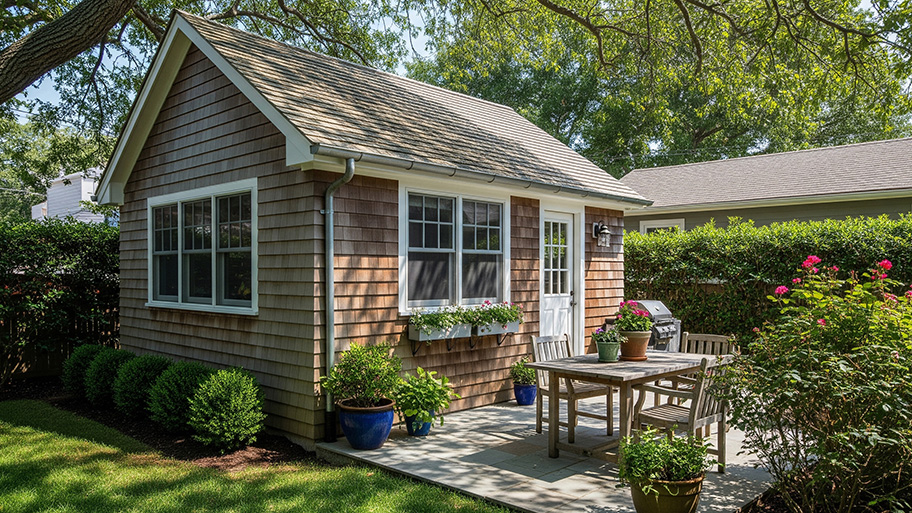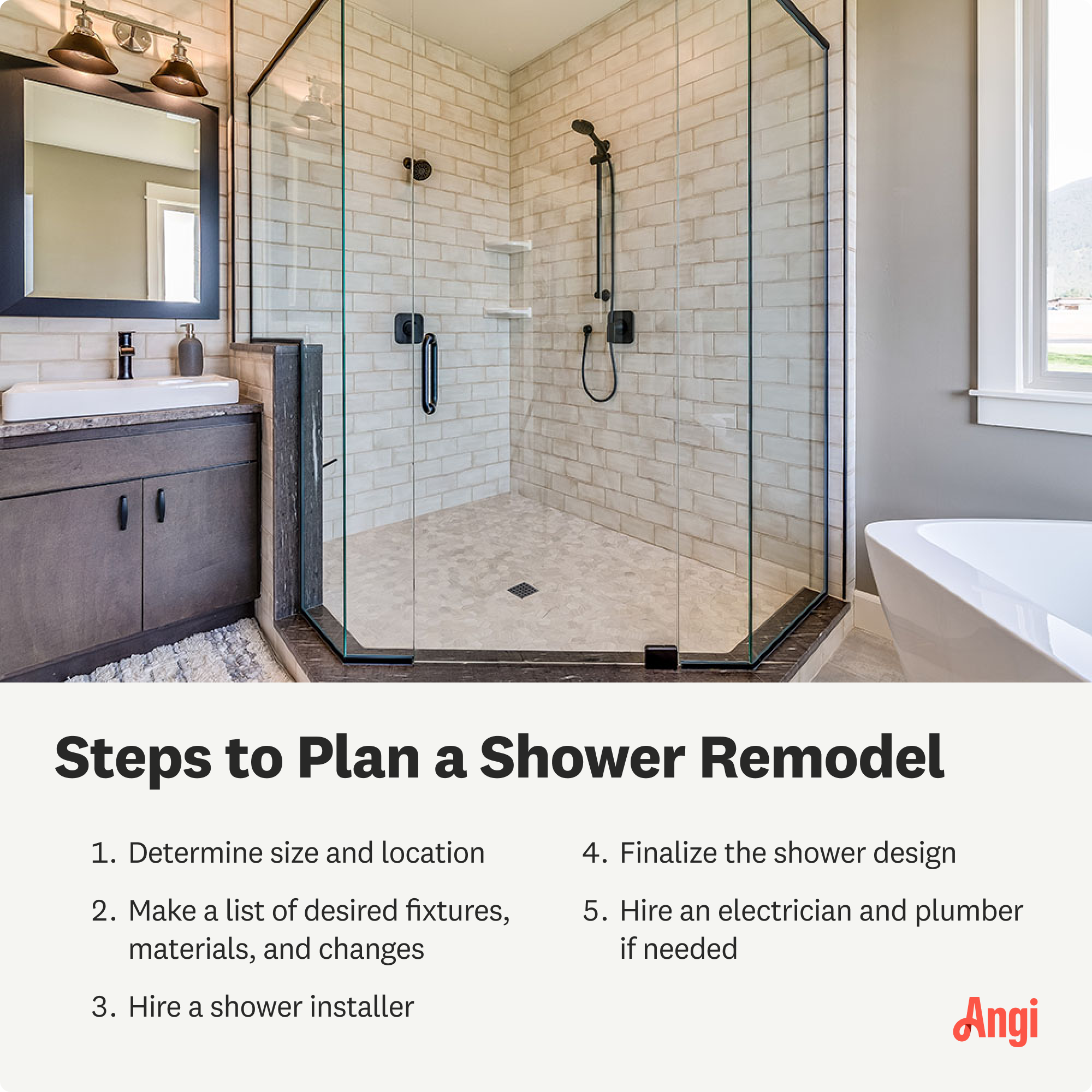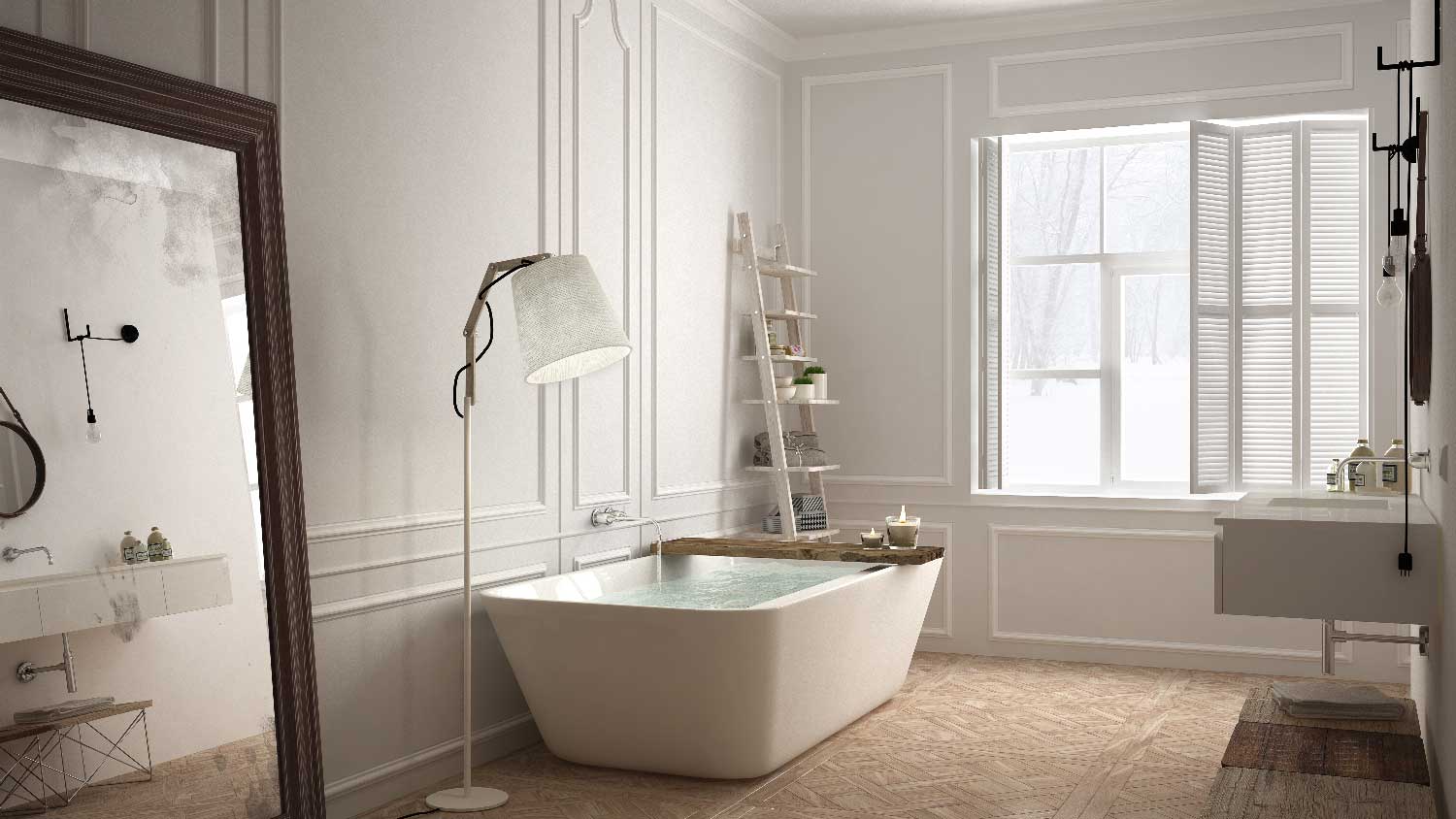
Accessory dwelling units can be a smart investment, but your ADU cost will depend on the size, type, and materials you choose. Here’s how it breaks down.
Shower remodeling costs $7,000 on average, but it can cost between $2,000 and $9,000, depending on the size and scope of the project. A shower installer can create an estimate for your ideal shower.


Prefabricated shower kits cost significantly less than custom showers at $200 to $8,000.
Material is a major cost factor. For custom showers, glass tile is the least expensive, while stone, solid surface, and ceramic tile are the most costly.
If you need to install new plumbing, expect to add $1,500 to $3,500 more to your budget.
Some municipalities require permits for shower remodels, so check if you need permits and budget for them accordingly.
Most great mornings kick off with a long, hot shower. But this little haven in our homes can naturally break down over time as it battles mold, mildew, and natural wear and tear. When it's time to spruce up your shower design, the average shower remodel costs $7,000. Expect to pay at least $2,000 for stylish new fixtures or up to $15,000 to overhaul the shower.

The scope of the remodel will dictate the amount of work needed and the cost to do it. Different project costs include:
| Shower Feature | Average Cost |
|---|---|
| Showerhead and faucet | $50–$900 |
| Shower door | $600–$1,350 |
| Full-body shower unit | $600–$12,000 |
| Regrouting shower tile | $10–$25 per sq. ft. |
| New tiles | $0.50–$50 per sq. ft. |
| New plumbing | $600–$3,500 |
| Stall installation | $700–$1,600 |

Many professional shower installers purchase pre-assembled kits from trusted brands. Kits may include a fiberglass or acrylic stall, a shower door, the faucets, and a showerhead, as well as the shower pan. Walk-in showers or tub-and-shower combos take a different approach.
Here are the main styles to consider:
These kits cost between $200 and $8,000, offering something for each budget. The cost of labor for installation is $400 to $1,000.
A tiled shower may cost a bit more, but it is necessary for a full, walk-in design to properly seal in water. Tiles also give you a bit more flexibility to show off your style, and you can opt for porcelain or glass. A new, 32-inch square walk-in shower costs as low as $350 for an acrylic shower kit and can go as high as $8,000.
You will find this combo in the majority of modern homes, both for its stylish bathroom design and to save space. If you're starting fresh, expect to pay an average of $3,000 for the bathtub and shower liner materials and labor.
Transforming your tub into a walk-in shower can be cost-effective since the plumbing already exists. Homeowners can expect to pay from $1,500 to $8,000. Costs vary based on materials, location, and scope, with prefab shower walls often lowering expenses.
Tub-to-shower conversions have an average ROI of 60%, but some buyers prefer to have at least one bathtub in the home. If you still have a bathtub in another bathroom, a walk-in shower could be worthwhile.
The cost to purchase the shower largely depends on its size, though materials also play a large part. Here’s a breakdown of what a shower may cost based on its size.
| Shower Size (Tub-and-Shower Combo) | Average Cost |
|---|---|
| 30-by-60 inches | $994–$3,400 |
| 32-by-60 inches | $780–$4,000 |
| 42-by-60 inches | $2,000–$2,400 |
| Shower Size (Walk-In Shower) | Average Cost |
|---|---|
| 30-by-60 inches | $750–$3,900 |
| 32-by-60 inches | $760–$4,400 |
| 36-by-36 inches | $700–$5,300 |
Materials have a large impact on the final shower remodel cost. When you’re deciding on your bathroom remodel ideas, you can choose between prefabricated options that come as one unit or you can choose custom tile. The following table breaks down the average cost for prefabricated shower materials:
| Prefabricated Shower Material | Average Cost |
|---|---|
| Acrylic | $500–$2,500 |
| Cultured marble | $700–$2,450 |
| Fiberglass | $400–$5,000 |
The following table breaks down the cost per square foot for custom shower materials:
| Custom Shower Material | Average Cost (Per Square Foot) |
|---|---|
| Ceramic tile | $0.50–$100 |
| Porcelain tile | $0.50–$30 |
| Stone tile | $5–$50 |
| Porcelain slab | $10–$30 |
| Glass tile | $10.50–$25 |
| Stone slab | $40–$65 |
| Solid Surface | $40–$70 |
The initial condition of the bathroom can also impact your bathroom remodel costs. If the overall bathroom is in good shape, and you’ll just be remodeling the shower, the total cost will be less than if there are other significant issues to tackle.
Replacing drywall costs between $1.50 and $3 per square foot, including the cost of materials and labor. New plumbing costs between $1,500 and $2,900 for a bathtub and between $1,500 and $3,500 for a shower.
There are several moving parts in a shower remodel project, so your best bet is to hire a shower installer near you to handle all the details from beginning to end. This includes everything from designing your new shower to installing all the components. You can expect the labor costs to make up 40% to 60% of the project.
The right design for your bathroom will be functional and beautiful, so it’s key to a successful project. Your contractor can help advise you on the best materials and fixtures to achieve the look you want.
Some shower installers will hire an electrician and plumber for you and bring in their own trusted pros, while others may recommend contractors from an approved list. If your shower installer hires outside pros for you, the extra costs should be included in the total project estimate.
Additional pros to consider hiring include:
Electrician: $50–$130 per hour
Plumber: $45–$200 per hour
Tile installer: $30–$120 per hour
Drywall installer: $400–$650 for a 100-square-foot bathroom
Outside of choosing the actual shower, there are additional costs and factors to consider when you tackle a shower remodel.
Depending on the scope of the shower remodeling project, permits may be required before you begin the work. To find out which permits you need, you can contact your municipality or discuss permit requirements with your contractor who should be knowledgeable on the subject. Permits can cost as little as $50 for small electrical or plumbing jobs, but for larger projects, they can cost up to $2,000, depending on the scope of the work and your location. The national average for building permits is around $1,600.
The total cost to remove the old tub or shower is typically included in the project's total cost (but double-check with your contractor to be sure). If you have some DIY skills and can remove the old shower on your own, you might save on total project costs. However, if you damage anything or create extra work for your bathroom pro, it will show up as additional labor costs.
Replacing the shower doors can give an old shower new life. Shower doors are essential if you’re converting a tub to a walk-in shower, and it’s important to choose doors that are durable and can stand up to regular use. Shower doors can be framed with metal or framed, and they can be hinged or sliding. Glass shower doors cost between $540 and $1,320. Frameless shower doors, however, can cost as much as $3,300.
Installing custom tile in a shower costs between $1,800 and $6,800. The cost can vary widely depending on the materials you choose. For instance, standard square or rectangle ceramic tiles cost less and are easier to install than irregularly shaped natural stone or glass tiles.
Plumbing can be a significant factor in your bathroom remodel cost. You may not need to pay for plumbing if you’re just switching out the showerhead. If you’re installing a new shower similar to the original, the plumbing may be able to stay the same, which can help you save money on the project.
However, if you’re installing a shower with drains and fixtures in different spots than the original or you’re moving the shower to a new location, you will likely have to move the plumbing to the right spot. New plumbing can cost between $600 and $1,600, depending on the complexity of the project.
If it’s time to upgrade from a standard shower to one with luxury features, that will add to the cost, but it will also add to the experience. Things like multiple showerheads, a frameless door, and a steam shower can elevate your bathroom.
| Additional Shower Features | Average Cost |
|---|---|
| Multiple showerheads | $75–$250 |
| Bi-fold glass doors | $750–$2,700 |
| Frameless doors | $1,000–$3,300 |
| Steam shower | $2,600–$6,050 |
| Shower bench | $100–$800 |
If you’re remodeling your shower due to water damage, or if you find water damage when you begin demolition, the repairs can add to the total cost. If water has been leaking behind the wall, you may find weakened beams, rot, water stains, and mold. Depending on the extent of the damage, repairing water damage can cost between $1,000 and $3,000, and removing mold and mildew can cost $500 or more.
If your bathroom fan is so loud that it interferes with your shower jam session, it’s time to replace it. A new fan costs between $100 and $300. You might be able to replace it on your own, but you should hire a pro if you need to install a fan in your bathroom for the first time.
While most caulking becomes dry to the touch in 60 minutes, wait 24 hours before using the shower or tub to let it cure fully.
Labor makes up roughly half the cost to remodel a shower, give or take, so you might be thinking about doing it yourself to save some money. However, incorrect installation can lead to water damage down the road, and the work can be challenging for anyone without extensive plumbing experience. That’s why we recommend hiring a local shower installation contractor.
A major bathroom remodeling project is best left to pros. Here’s why to hire a contractor to tackle your new shower installation:
The work may require specialized plumbing and electrical knowledge.
Incorrect installation can result in costly water damage.
Shower installation can easily be packaged with a larger bathroom remodeling project.
Pros can obtain permits and remove (and dispose of) your old shower.
In most cases, you should hire a shower installer to tackle this project. That said, there are some instances where DIY might be achievable, like if:
You’re simply retiling your existing shower and have done this kind of work before.
You’re swapping out one or two fixtures.
You have extensive plumbing experience and are comfortable with more complex remodeling work.
If you want to save some money on your shower remodel, there are a few things you can do that will give your shower a refresh without driving up your costs:
Choose less expensive fixtures, including faucets, showerheads, and light fixtures.
Remove the old tub or shower on your own.
Go with less expensive materials, like acrylic or fiberglass, over more expensive cast iron or solid surface options.
If you really want to save some money, replacing the fixtures, giving the shower a deep clean, and switching out the old shower curtain for a new one can give the shower a facelift without requiring any demo or a large budget.
Remodeling your shower can increase your home’s value. The average return on investment (ROI) for a bathroom remodel is 73%. The projects with the highest ROI, around 70%, include accessibility remodels that add features to make a bathroom wheelchair-friendly, or standard remodels with classic upgrades and fixtures. Upscale shower remodels with luxurious options and walk-in shower setups have an ROI of around 55%.
If you don’t have a big budget for a major remodel, you can still level up your home’s appeal by tackling smaller jobs. Upgrading to modern fixtures like a rainfall showerhead, swapping out old lighting with sleek, LED fixtures, and installing brand-new hardware can make your bathroom stand out to homebuyers.
Talk to your pro about various shower and tub options and sizes, including what’s practical for your space and what adds the most value to your home.
If your budget allows, ask your shower contractor if they can do a larger bathroom remodel, including your toilet, vanity, lighting, flooring, and more.
Ask your contractor if they’ll handle the necessary construction permits and disposal of old shower materials.
Home is the most important place on earth, which is why Angi has helped more than 150 million homeowners transform their houses into homes they adore. To help homeowners with their next project, Angi provides readers with the most accurate cost data and upholds strict editorial standards. We extensively research project costs to develop the pricing data you see, so you can make the best decisions for you and your home. We rely on reputable sources, including the U.S. Bureau of Labor Statistics, academic journals, market studies, and interviews with industry experts—all to ensure our prices reflect real-world projects.
Want to help us improve our cost data? Send us a recent project quote to [email protected]. Quotes and personal information will not be shared publicly.
Time to reinvent your morning routine? Start your shower remodeling process by researching shower installers and fitters in your area. These pros can handle everything from sourcing materials to making sure your installation is sealed properly. Once you find the right team:
Determine your budget
Discuss the extent of your remodel with your contractor
Hire an interior designer if necessary
Choose a plumber for more extensive projects
Shower remodels cover everything from updating tiles to replacing an old bathtub, so tailor the project to your unique vision.
A walk-in shower can increase the value of your home, but there are many factors at play in the final home. Buyers with young children often want a bathtub, so if you’re in a neighborhood with young families, ensuring there’s at least one bathtub in the home may increase the home value. Walk-in showers can increase the home value because of increased accessibility and modern style.
A shower remodel can take a few days or weeks, depending on the extent of the remodel. Other factors that include the time it will take to complete the remodel include the availability of materials, the contractor’s schedule, and the experience of the person installing it.
From average costs to expert advice, get all the answers you need to get your job done.

Accessory dwelling units can be a smart investment, but your ADU cost will depend on the size, type, and materials you choose. Here’s how it breaks down.

The cost to add a half bathroom varies based on geography and your choice of additions. Read on to discover just what factors into your total project cost.

If your bathroom needs sprucing up, a new vanity will make a big difference. Vanity installation costs depend on the size and type of the countertops and fixtures you choose.

This prep and staging area has numerous uses in the versatile modern home. Here’s what a butler’s pantry does and how you can add one to your home.

Discover the average walk-in bathtub installation cost, key price factors, and ways to save. Get expert tips to plan your walk-in tub project with confidence.

An updated bathtub can give a bathroom a whole new look. Find out how much it costs to replace a bathtub in Minneapolis, MN, including prices by type and labor costs.